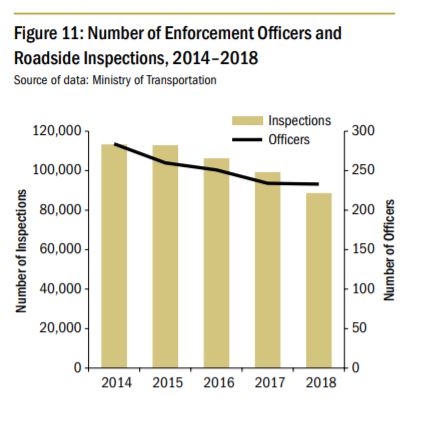Auditor General report blasts MTO over truck inspections

Ontario’s auditor general has sharply criticized the Ministry of Transportation over falling roadside commercial vehicle inspections, saying not enough is being done to ensure road safety.
The rebuke came in the Annual Report released on Wednesday by Auditor General Bonnie Lysyk.
The audit found that there are many opportunities for the ministry to improve overall safety through its Commercial Vehicle Safety and Enforcement Program, the report said.
It said one of the most important activities the ministry performs to ensure safety is its roadside inspections of commercial vehicles.
 “However, we found that between 2014 and 2018, the number of inspections the ministry conducted decreased by 22%, from over 113,000 in 2014 to fewer than 89,000 in 2018, because the ministry was unable to fill enforcement officer vacancies, and because the majority of enforcement officers did not meet their individual annual productivity targets for the number of inspections to complete.”
“However, we found that between 2014 and 2018, the number of inspections the ministry conducted decreased by 22%, from over 113,000 in 2014 to fewer than 89,000 in 2018, because the ministry was unable to fill enforcement officer vacancies, and because the majority of enforcement officers did not meet their individual annual productivity targets for the number of inspections to complete.”
It said, as a result, the ministry missed the opportunity to remove thousands of additional unsafe commercial vehicles and drivers from Ontario’s roads.
The report also said that the ministry had estimated that Ontario’s truck traffic increased 10% from 2009 to 2018.
In the 10 years from 2008 to 2017, commercial vehicles (large trucks and buses) were involved in over 182,000 collisions in Ontario, it said.
The collisions resulted in almost 44,000 injuries and 1,180 fatalities.
Commercial vehicles were at-fault in 46% of these collisions, including 33% of collisions that resulted in a fatality, whether due to the driver’s actions or the vehicle’s condition, the report said.
“According to the ministry, the direct social cost of large truck collisions in Ontario for the five-year period from 2011 to 2015 (the most recent data available) was $2 billion,” the report added.
That includes costs related to property damage, healthcare, police, courts, fire and ambulance services, tow trucks and traffic delays.
 The report noted that Ontario consistently ranks among the safest provinces in Canada and compares favorably to the U.S. for overall road safety.
The report noted that Ontario consistently ranks among the safest provinces in Canada and compares favorably to the U.S. for overall road safety.
“However, Ontario maintained higher fatality and injury rates than Canada as a whole and the United States in the majority of years between 2008 and 2017 when evaluating only commercial vehicles,” the report said.
From 2014/15 to 2018/19, the ministry spent over $200 million on commercial vehicle enforcement, including $39.4 million in the 2018/19 fiscal year.
In 2018, about 60,000 carriers were registered to operate in the province and there were over 290,000 registered commercial vehicles.
The report also criticized Ontario’s driver training standards.
“We also found that driver training is not mandatory for some of the highest risk commercial driver’s licence classes, and that Ontario allows commercial vehicle driver licensing practices that are uncommon in other jurisdictions, such as allowing commercial vehicle carriers (businesses that operate commercial vehicles) with a poor collision history to test their own drivers for commercial vehicle driver’s licenses.”
It also accused the ministry of not effectively monitoring and taking action to address high-risk Motor Vehicle Inspection Station (MVIS) garages, which issue safety certificates for commercial vehicles.
- More unsafe commercial vehicles and drivers could have been removed from the roads with more inspections.
- Roadside inspection enforcement is not consistent across the province, impacting the effectiveness of roadside inspections in preventing collisions.
- The majority of carriers have not had a vehicle inspected in the past two years, including carriers with a poor collision history.
- Most roadside inspections are performed on provincial highways, allowing “local haulers” to avoid inspection.
- Despite a high risk of collisions, the ministry does not sanction municipalities.
- The ministry does not assess the reasonableness of kilometers traveled reported by carriers that are used to calculate safety ratings.
- Mandatory Entry-Level Training (MELT) has not been extended to other commercial class driver’s licenses.
- The ministry allows some carriers with a poor history of collisions to test their own employees for commercial vehicle driver licenses.
- There is no mandatory drug and alcohol testing for commercial vehicle drivers.
The audit concluded that the ministry does not have fully effective and efficient processes and systems to consistently carry out safety programs that promote and enforce the operation of commercial vehicles.
The full report is available here.
Ministry response
In its response, the ministry said it appreciates the work of the auditor general and welcomes the recommendations on how to improve the Commercial Vehicle Safety and Enforcement Program.
“We agree with all the recommendations and are committed to implementing them as quickly as possible and will report back regularly on our progress,” it said.
Report by Abdul Latheef
